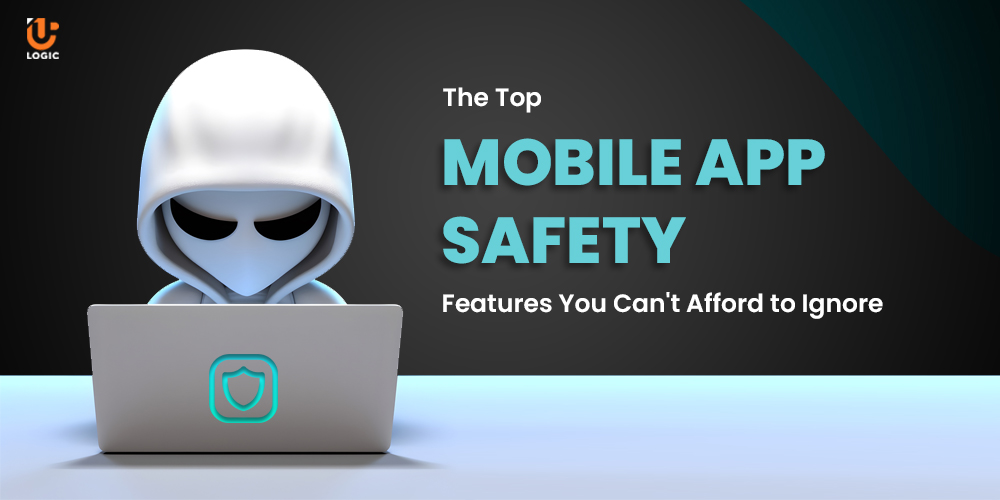
The Top Mobile App Safety Features You Can’t Afford to Ignore
A data breach exposed the personal information of approximately 4.5 million individuals and another breach exposed the credit and debit card information of nearly 40 million customers. You could have come across news like this in recent times. Do you know what it is? And how does it happen? If you are walking in the streets, you can find 9 out of 10 people holding smartphones looking into mobile app in their hands.
As technology advances, so do the potential risks associated with mobile app usage. The data control we provide to our mobile devices is equally important. We allow permissions such as our contact, gallery, message, and location. This information puts you at risk. To avoid those risks, mobile app development should add security features.
If you are a tech geek, if you are in a business that uses traditional methods, or if you are in the process of developing an app for your business, then continue reading this blog. This article explores fine mobile security, shedding light on its irresistible safety features.
What is Mobile App Security?
Mobile app security is safeguarding apps and data, furthermore, from various threats. The measures and precautions taken to protect apps vary depending on threats. The security of applications has become a critical aspect in the digital landscape. Because of smartphone usage and the personal and professional data stored in it.
When you develop an app for your business, it is protected from threats. When customers feel safe, they are more likely to use your product or service, which means an increase in usage and growth for your business. Because the application you use will store customer data. Only when they feel safe and use it in large numbers will your business grow. So analyze the different risk factors and make it safe in the mobile app development process.
Different Types Of Attacks Possible To The Mobile App
There are different types of threats possible for mobile apps. The most common and dangerous attacks are listed below.
Malware
One of the primary threats to mobile apps is the infiltration of malware. These malicious programs can compromise the integrity of an app, leading to data theft. Thus activities like unauthorized access can result in compromised user experience.
Phishing Attacks
Phishing attacks deceive customers to provide information such as credentials or personal details. Mobile apps are susceptible to phishing attempts, making it crucial to add robust security measures.
Data Leaks
Mobile apps often handle sensitive user data. Threats like data leaks can occur due to poor security practices. And so resulting in the unauthorized exposure of personal information.
Tampering
A tampering attack is in which the harmful alteration of information occurs. Unauthorized persons alter the data so that its security is compromised. They typically aim to achieve a malicious advantage or interrupt functionality.
Injection of malicious logic
Injection of malicious logic refers to the insertion of harmful code into an app. This malicious code can take various forms, including viruses, worms, trojan horses, spyware, and ransomware. Attackers use injection techniques to gain unauthorized access, and steal sensitive information. And then they disrupt system operations or cause damage to the target system.
These threats are harmful to the users and owners. Counter-attacks exist but securing while developing the app will create a safer feeling.
Important Safety Features for Mobile App Development
As we discussed above, for a safe environment, app development must have safety actions for protection. The processes are as follows.
Encryption
Utilizing strong encryption protocols safeguards data during transmission and storage. Encryption prevents unauthorized access by converting information into unreadable code that can only be deciphered with the appropriate key.
Regular Security Audits
Conducting regular security audits helps identify vulnerabilities in the mobile app. By proactively addressing potential weaknesses, developers can fortify the app against emerging threats.
Use a Code-Signing Certificate
Code signing is a security practice that involves digitally signing executable files or scripts to verify their authenticity and integrity. Developers use a private key to sign their code, and the recipient uses the corresponding public key to verify that the code has not been tampered with.
This helps prevent the distribution and execution of unauthorized or tampered code.
Only Use Authorized APIs
Ensuring that your application only interacts with authorized and secure APIs helps prevent security vulnerabilities. Because app development may need APIs for various purposes, regularly check and update API keys, tokens, or other credentials to maintain access control.
Secure the Backend
Strengthening the security of the server-side or backend infrastructure. Use encryption (HTTPS) to secure communication between the client and the server. Add firewalls and intrusion detection/prevention systems to supervise and mitigate potential attacks.
Deploy Tamper Detection
Detecting and preventing unauthorized modifications to the application’s code or data. Incorporate mechanisms to detect changes in the application’s files or codebase.
Reduce Storage of Sensitive Data
Reducing the risk associated with storing sensitive information. Avoid unnecessary storage of sensitive data, such as passwords or credit card information. When storage is necessary, use encryption to protect the stored data.
Programming Languages And Their Grounds Of Security
Different languages are used for app development. And each language has its own security features. Come, let’s know some:
Java
Java is a versatile, object-oriented programming language known for its platform independence. Widespread use in developing applications ranging from web services to mobile and enterprise solutions.
Specialization of Java
You can use Java to create secure backend systems and authorization frameworks. Java has improved code security by adding stronger memory protection measures. It will keep the code safe.
Python
Python is a high-level, interpreted programming language valued for its versatility and extensive community support, suitable for various applications.
Specialization of Python
Python has updated security so you can secure your sensitive information. Enabling automation in your system is simple with Python.
JavaScript
JavaScript is a versatile, dynamic scripting language primarily used for web development to enhance interactivity and create dynamic content on websites.
Specialization of Javascript
JavaScript helps you control the inputs in the website sandbox. You can avoid threatening characters with the new update.
Kotlin
Kotlin is a concise and interoperable programming language, featuring modern syntax and strong support for object-oriented and functional programming paradigms.
Specialization of Kotlin
Kotlin ensures no empty boxes cause crashes with the new version. You can secure apps for both Android and iOS and prevent any potential downtime. It can be used for payment processing
Swift
Swift is a powerful and intuitive programming language developed by Apple for iOS, macOS, watchOS, and tvOS app development, emphasizing safety, performance, and modern syntax.
Specialization of Swift
Swift has introduced an ID check to ensure there are no fake users. It also added pointer protection for memory to avoid threats. If you want to build a secure iOS application or network security app, Swift should be your top choice.
These are a few famous programming languages and their specializations.
Best App Development Companies
By understanding the types of threats and meanwhile prioritizing essential safety features, create secure, trustworthy mobile apps that stand out in a competitive digital landscape. Moreover, choosing the right mobile app development company is paramount to ensuring the incorporation of top-notch security features. Additionally, opting for a reputable app development company like Uplogic Technologies further ensures that your app is equipped with the latest security measures, providing users with a safe and seamless experience.
Comments are closed.


